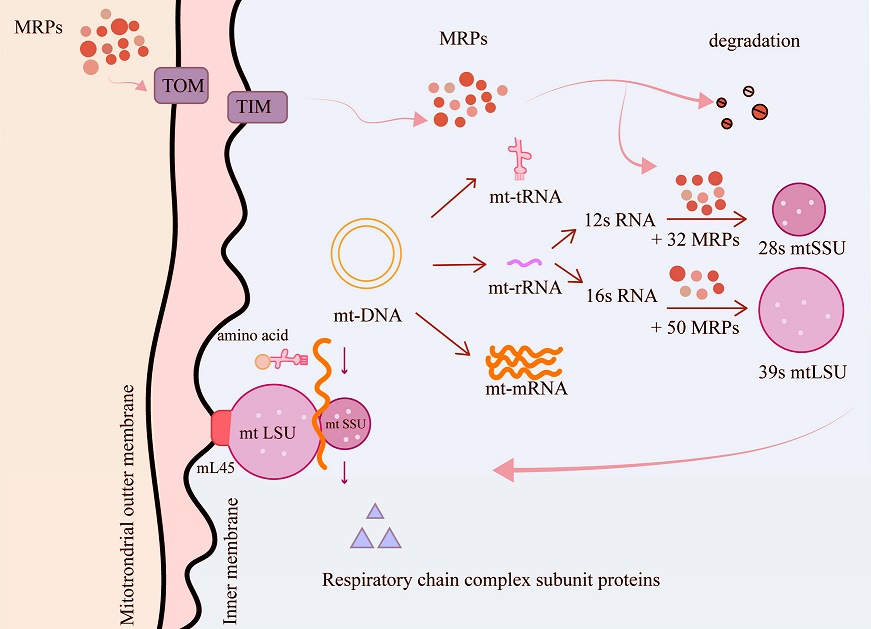Nikhil Prasad Fact checked by:Thailand Medical News Team Jan 13, 2025 11 months, 1 week, 3 days, 11 hours, 15 minutes ago
Medical News: Recent advancements in cancer biology have spotlighted mitochondrial ribosomal proteins (MRPs) as critical players in the intricate mechanisms underlying cancer development. This
Medical News report explores findings from researchers at the Department of Pathology and the Translational Medicine Center of The Affiliated Taizhou People’s Hospital of Nanjing Medical University in China, highlighting the pivotal role of MRPs in cancer biology.
 Mitochondrial Ribosomal Proteins and Their Role in Cancer
Mitochondrial Ribosomal Proteins and Their Role in Cancer
Mitochondria are often referred to as the powerhouse of cells, generating the energy essential for various cellular functions. Within these organelles, mitochondrial ribosomes (mitoribosomes) carry out the translation of 13 mitochondrial DNA-encoded proteins that are integral to the mitochondrial respiratory chain. MRPs, which are encoded by nuclear DNA and imported into mitochondria, form the backbone of these mitoribosomes. Their role in mitochondrial function and their implications in cancer have recently come under intense scrutiny.
Understanding MRPs and Mitoribosomes
MRPs are categorized into two groups: 30 small subunit proteins (MRPS) and 52 large subunit proteins (MRPL). Together, these proteins form a functional 55S mitoribosome, consisting of a 28S small subunit and a 39S large subunit. These structures are essential for synthesizing mitochondrial proteins critical for energy metabolism and cellular vitality. Unlike cytoplasmic ribosomes, mitoribosomes exhibit unique structural and compositional attributes, with a protein-to-RNA ratio that facilitates their specialized functions.
Mitoribosomes are anchored to the inner mitochondrial membrane, with their biogenesis orchestrated within specific compartments in the mitochondrial matrix near the mitochondrial DNA (mtDNA). This dynamic interplay between nuclear and mitochondrial genomes ensures the efficient production and assembly of mitochondrial proteins, reinforcing the intricate dependency between these genetic systems.
MRPs in Cancer Biology
The altered expression of MRPs has emerged as a hallmark in various cancers. These changes impact mitochondrial function, leading to disruptions in energy metabolism and apoptosis regulation - processes often hijacked by cancer cells for survival and proliferation.
For example, MRPS23 and MRPS30 have been identified as regulators of apoptosis, influencing pathways like the c-Jun N-terminal kinase (JNK1) signaling. Similarly, MRPL41 interacts with Bcl-2 proteins, stabilizing p53 and facilitating its mitochondrial translocation to trigger apoptosis. Dysregulation of these MRPs can compromise apoptosis, enabling cancer cells to evade programmed cell death.
The Link Between MRPs and Specific Cancers
-Lung Cancer
Lung cancer remains the leading cause of cancer-related deaths globally. Studies reveal differential expression patterns of MRPs in lung adenocarcinomas (LUADs) and lung squamous cell carcinomas (LUSCs). Eight MRPs, including MR
PL12 and MRPS33, are significantly upregulated in LUADs. In LUSCs, 22 MRPs are upregulated, with some playing roles in enhancing mitochondrial oxidative phosphorylation, a key metabolic adaptation in lung cancer cells.
-Breast Cancer
Breast cancer, the most diagnosed cancer among women, also exhibits distinct MRP expression profiles. MRPL13 and MRPS27 are notably upregulated in triple-negative breast cancer (TNBC), where they influence tumor growth, invasiveness, and chemotherapy resistance. Furthermore, MRPL12’s role in modulating immune cell infiltration underscores its potential as a therapeutic target.
-Digestive System Cancers
In gastric cancer, upregulation of MRPs like MRPS17 and MRPL35 enhances oxidative phosphorylation, fueling cancer metabolism. MRPL35, in particular, facilitates tumor progression by regulating key proteins involved in cell survival and DNA repair. In colorectal cancer, MRPL33’s alternative splicing highlights its dual role in promoting proliferation and modulating chemotherapy sensitivity.
Conclusion and Implications
The exploration of mitochondrial ribosomal proteins has unveiled their critical roles in cancer biology, from sustaining mitochondrial function to influencing cell survival and death. As emerging biomarkers, MRPs hold promise for improving cancer diagnosis, prognosis, and therapy. Their involvement in energy metabolism and apoptosis positions them as targets for precision oncology.
The study highlights how MRPs, such as MRPS23, MRPS27, and MRPL41, mediate crucial pathways that cancer cells exploit for unchecked growth. Therapeutic strategies aimed at normalizing MRP expression or inhibiting their cancer-promoting functions could open new avenues in cancer treatment.
In conclusion, mitochondrial ribosomal proteins are more than molecular components of mitochondrial machinery; they are pivotal determinants of cellular fate in cancer. By deepening our understanding of these proteins, researchers can pave the way for innovative therapeutic strategies that target the very foundations of cancer metabolism and survival.
The study findings were published in the peer-reviewed journal: Medicina.
https://www.mdpi.com/1648-9144/61/1/96
For the latest Cancer news, keep on logging to Thailand
Medical News.
Read Also:
https://www.thailandmedical.news/news/melittin-from-honey-bee-venom-shows-promise-against-t-cell-leukemia
https://www.thailandmedical.news/news/oyster-mushrooms-emerging-as-a-game-changer-in-cancer-therapy
https://www.thailandmedical.news/news/breaking-past-cancer-studies-using-rodents-are-flawed-because-it-has-now-been-found-that-human-pd-1-functions-differently
